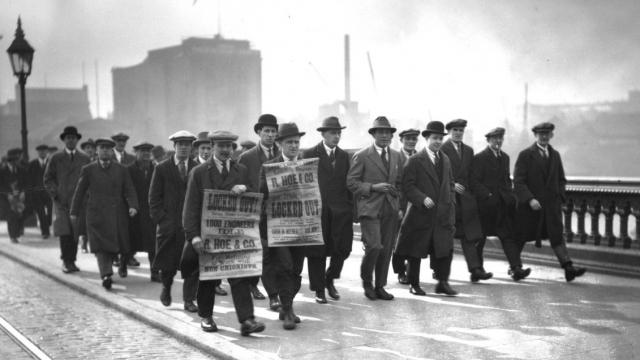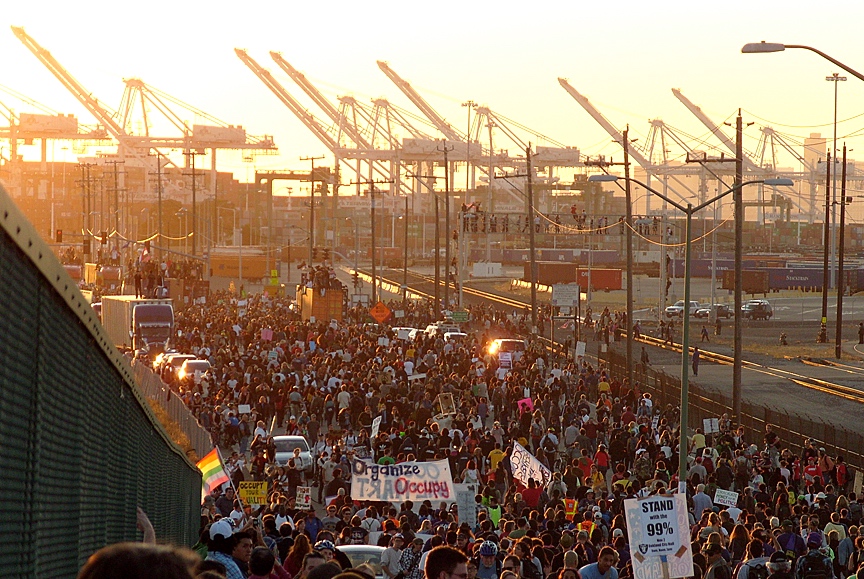
On Monday, Dec. 15, all of Belgium was completely shut down from a nationwide general strike in protest of economic reforms that largely punish working people. The strike cancelled 600 flights for 50,000 passengers at the Brussels airport. High-speed trains to France, Netherlands, and the UK were all cancelled, buses didn’t run their routes, workers didn’t come to the office, and nobody went to school. While numbers aren’t yet available, Belgian workers certainly demonstrated that they are the ultimate deciders of whether or not the economy works for everyone or grinds to a halt. The U.S. should take a page from the Belgian playbook if we want to beat back the corporate assault on our livelihoods, homes and futures.
Belgium Fights Back
The general strike was the climax of a series of actions that started on Nov. 6, when over 100,000 workers mobilized to launch a movement resisting the new government’s austerity measures. After being elected in October, Prime Minister Charles Michel laid out plans to raise the retirement age, freeze a cost-of-living increase for public workers, and drastically cut budgets for public services like healthcare and education. Michel says the programs, recommended by the IMF and the European Union, will save an additional $13.7 billion over five years, but workers say the new government’s austerity measures will end up costing the economy an additional $2.5 billion. For a good example of how central banks’ forced austerity doesn’t work, look to Greece.
Banker-imposed austerity in Greece worked precisely how it was supposed to – punishing the poor to reward the rich. On average, Greeks are 40 percent poorer than they were in 2008, while rich Greeks are 20 percent richer, according to a 2014 report from the Levy Economics Institute at Bard College. That same report points out that Greeks’ purchasing power is down 37 percent after wages were slashed by 25 percent. While big banks were bailed out, the Greek unemployment rate has climbed to 27 percent while pensions and social services have been slashed. Anywhere in the world the austerity agenda is implemented, it only brings more misery to working people.
How Belgium’s Class War Mirrors the U.S.
When it comes to economic inequality, Belgium and the United States have a lot in common. While the U.S. is the world’s second-richest country, Brussels, Belgium is the third-richest region in the European Union. Yet, while the richest 1 percent of the United States captured 95 percent of all gains from the recent economic "recovery" the U.S. still has the second-highest child poverty rate in the world. Similarly, one in three children in Brussels lives in poverty.
The employment picture in the U.S. and Belgium is equally bleak. Youth unemployment in Belgium is 24 percent as of October 2014. In the US, a staggering 12.8 percent of youth are unemployed. While there are jobs available for highly-educated workers in both countries in certain high-tech industries, education is only available to the economically privileged. For most living-wage jobs in the U.S., a prerequisite to consideration is a college degree. However, the average American college graduate is $30,000 in debt upon leaving school, and 18 percent of Americans say they'll be in debt for the rest of their lives.
In Belgium, there are 112 inquiries for every one job vacancy, and jobs that do pay enough to make a living are unavailable to the country’s vast migrant population. This is largely due to persisting education inequality that leaves Belgium’s immigrants at a crippling disadvantage. A 2012 report from L’appel pour une ecole democratique (APED) analyzed data from the Program for International Student Assessment and found that schools in both Belgium and France ranked behind all other countries in providing equal opportunity for both migrant and native students to succeed. In Belgium, there was a far higher representation of migrant children in underprivileged schools, higher dropout rates, and widespread discrimination against students based on their country of origin.
Likewise in the U.S., a 2012 report by the Schott Foundation for Public Education found that in New York City, black and latino students are four times as likely to be enrolled in understaffed, underfunded schools than white students. The report also found that none of New York City’s highest-performing schools were located in majority black and latino neighborhoods, like Central Brooklyn, South Bronx, and Harlem. Likewise, in Chicago, Mayor Rahm Emanuel closed 54 public schools in mostly poor neighborhoods with a high concentration of black students, while allocating over $300 million to a slush fund that largely benefits his campaign donors. Philadelphia closed 23 schools in low-income neighborhoods while spending $400 million on a new prison. See the pattern yet?
The Escalating Class War in the U.S.
While there’s no call for a general strike in the U.S., there should be, given the austerity budget that just passed Congress. The $1.1 trillion “cromnibus” spending bill that will fund the federal government through next September includes a Christmas wish list for the banks and a stocking full of coal for those who need the most help. $300 million was diverted from Pell Grants to student loan debt collectors, making access to higher education even more of a pipe dream for low-income would-be college students. $300 million was cut from support housing programs that help ease chronic homelessness. Another $93 million was cut from the program that provides food assistance to low-income women, infants, and children. In the meantime, Congress spent $479 million on the F-35 jet, which not even the Pentagon wants, and used taxpayers as the cushion for the big banks whenever the $700 trillion derivatives bubble pops. But the crominbus is just the beginning.
The Trans-Pacific Partnership (TPP), which has been negotiated in secret between government officials and over 600 corporate lobbyists for over a year, is likely to become a reality after the 114th Congress is sworn in this January, and possibly even before then. President Obama may try to fast-track the deal through Congress, meaning it will be put to an up-or-down vote without even a chance for discussion or debate of its contents. The reason the details of the TPP have been so closely guarded and why the process is being rushed is due to the horrific nature of the agreement, at least the parts that have been made available to the public.
If the TPP were put into place, it would effectively make world governments subservient to multinational corporations. It would make it easier for companies like Walmart to ship jobs to Vietnam, where workers are paid half as much as in China, and enable the same hazardous working conditions that led to the collapse of a Bangladesh clothing factory in 2013, or the Triangle Shirtwaist Fire in New York during the Industrial Revolution.
The TPP would also set up corporate tribunals, in which corporations could sue any government over any environmental or labor regulation for infringing on the company’s expected future profits. If the TPP were ratified, any attempt to break up the big banks or regulate toxic derivatives trading would be prohibited, and enable corporations to shift even more profits overseas to avoid paying domestic taxes. The only thing that could affect corporate power after the TPP’s ratification would be a general strike – particularly in the U.S., where a lot of these corporations rely on American customers to buy their products.
General Strikes Give Corporations a Dose of Their Own Medicine
IWW organizer Big Bill Haywood accurately described the relationships between working people and the ownership classes in that workers have “always been taught” to care for the capitalist’s private property, while owners will readily go on a capital strike and shut down a factory or ship jobs elsewhere if anything happens to their profits. A general strike thereby flips the tables on the capitalists, depriving the ownership class of their profits if owners do anything to upset workers’ wages, working conditions, or benefits. In doing so, workers remind owners and political leaders that the performance of the economy is entirely dependent on workers being happy and having their needs met.
General strikes have been used throughout the last century as a means for working people to assert power over the ownership class, in countries from Honduras to Yemen. In 2000, a general strike stopped the Bechtel Corporation from privatizing Cochabamba, Bolivia’s water supply. During the initial popular revolt in Egypt in 2011, before the movement was co-opted by the military, protest organizers successfully organized strikes that cost the Egyptian economy $310 million a day. The April 6 movement that preceded the 2011 uprising successfully organized a nationwide general strike several years before that had similar impacts on the economy.
There’s never been a better time to organize a general strike in the U.S. than right now, with both the corporate owners and political leaders pillaging public resources for their own private gain. If the Trans-Pacific Partnership is ratified, or if the government authorizes another bailout of the big banks with our money, the citizens can choose to either shut down the corporate establishment by depriving it of their labor and purchasing power, or succumb to the global corporate coup. The choice is ours to make.
3 WAYS TO SHOW YOUR SUPPORT
- Log in to post comments














